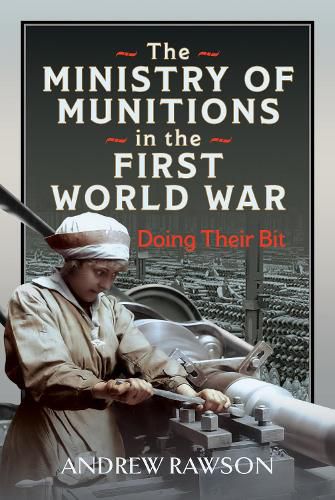Readings Newsletter
Become a Readings Member to make your shopping experience even easier.
Sign in or sign up for free!
You’re not far away from qualifying for FREE standard shipping within Australia
You’ve qualified for FREE standard shipping within Australia
The cart is loading…






This is the history of Britain's munitions industry in the First World War. It begins with the shortages caused by an expanding army required to fight in trenches, then shows how the country was organised, with the expansion of private companies and the introduction of state owned factories. It also explains how new laws regulated industry. The narrative describes how production was initially estimated, until experience illustrated how the armed services' demands could be met. It also looks at the problems caused by unchecked enlistment, which took no account of men's skills, and the attempts to recall key workers from the armed services. The story continues with the raw materials, such as coal, which was dug by one million miners, and the huge amounts of iron ore imported from Spain. Learn how Britain's steel industry struggled to make enough forgings for shells, while many more were imported from North America. See how manufacturing issues were resolved, while battlefield experience led to modifications being made. Also see how the nation's chemical industry expanded to produce enough explosives before working out how to make large amounts of lethal gases. Learn how the war required the relations between the government, the employers, the unions, and the workforce to change; in some cases, forever. See how diluting production allowed the workforce to increase and how tens of thousands of women entered the factories. Also hear how various issues caused widespread industrial unrest at times, as the cost of living rose and the rules became stricter. On a positive note, a desire to improve production increased awareness of health and safety, as well as the benefits of positive welfare. The story ends with a nation being pushed to its limits suddenly demobilising, leaving everyone wondering what the future would hold for them. AUTHOR: Andrew Rawson has over forty books to his name, including eight Pen and Sword 'Battleground Europe' travel books and three History Press 'Handbook' reference books. He has edited the minutes of the Second World War conferences and the top-secret correspondence between George C. Marshall and Dwight D. Eisenhower. His books include covering Poland's struggle in the twentieth century, Auschwitz Extermination Camp and wartime Krakow. He has also written a ten-part series on the Western Front campaigns between 1914-18. He has a master's degree with Birmingham University's history department. 20 b/w illustrations
$9.00 standard shipping within Australia
FREE standard shipping within Australia for orders over $100.00
Express & International shipping calculated at checkout
Stock availability can be subject to change without notice. We recommend calling the shop or contacting our online team to check availability of low stock items. Please see our Shopping Online page for more details.
This is the history of Britain's munitions industry in the First World War. It begins with the shortages caused by an expanding army required to fight in trenches, then shows how the country was organised, with the expansion of private companies and the introduction of state owned factories. It also explains how new laws regulated industry. The narrative describes how production was initially estimated, until experience illustrated how the armed services' demands could be met. It also looks at the problems caused by unchecked enlistment, which took no account of men's skills, and the attempts to recall key workers from the armed services. The story continues with the raw materials, such as coal, which was dug by one million miners, and the huge amounts of iron ore imported from Spain. Learn how Britain's steel industry struggled to make enough forgings for shells, while many more were imported from North America. See how manufacturing issues were resolved, while battlefield experience led to modifications being made. Also see how the nation's chemical industry expanded to produce enough explosives before working out how to make large amounts of lethal gases. Learn how the war required the relations between the government, the employers, the unions, and the workforce to change; in some cases, forever. See how diluting production allowed the workforce to increase and how tens of thousands of women entered the factories. Also hear how various issues caused widespread industrial unrest at times, as the cost of living rose and the rules became stricter. On a positive note, a desire to improve production increased awareness of health and safety, as well as the benefits of positive welfare. The story ends with a nation being pushed to its limits suddenly demobilising, leaving everyone wondering what the future would hold for them. AUTHOR: Andrew Rawson has over forty books to his name, including eight Pen and Sword 'Battleground Europe' travel books and three History Press 'Handbook' reference books. He has edited the minutes of the Second World War conferences and the top-secret correspondence between George C. Marshall and Dwight D. Eisenhower. His books include covering Poland's struggle in the twentieth century, Auschwitz Extermination Camp and wartime Krakow. He has also written a ten-part series on the Western Front campaigns between 1914-18. He has a master's degree with Birmingham University's history department. 20 b/w illustrations